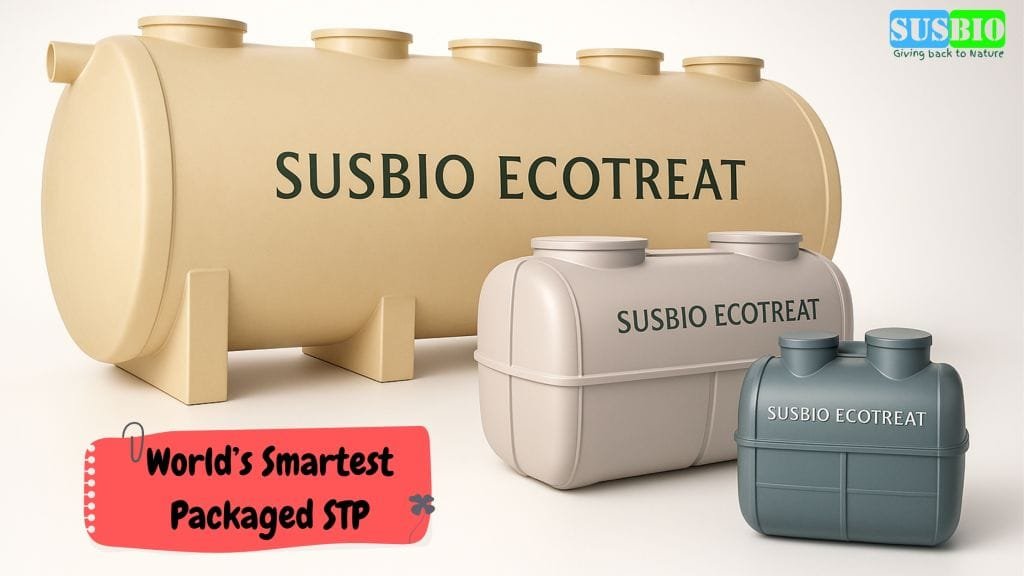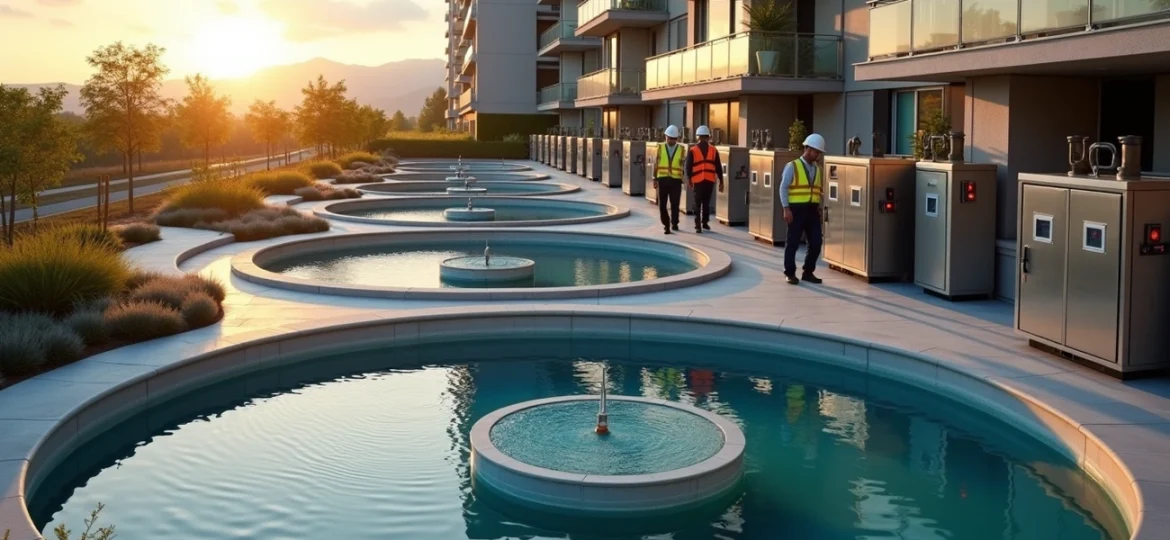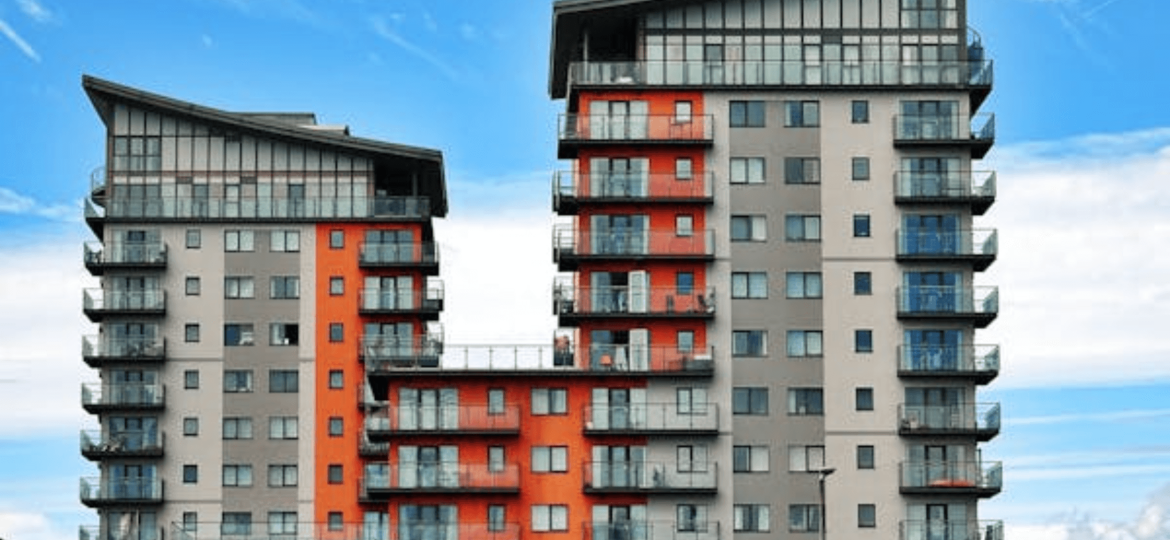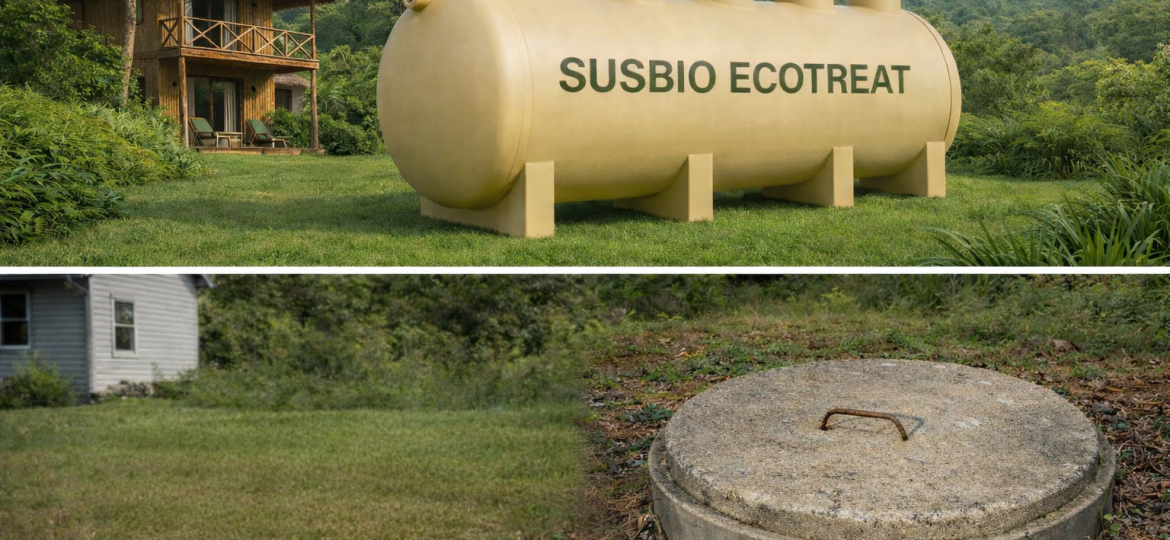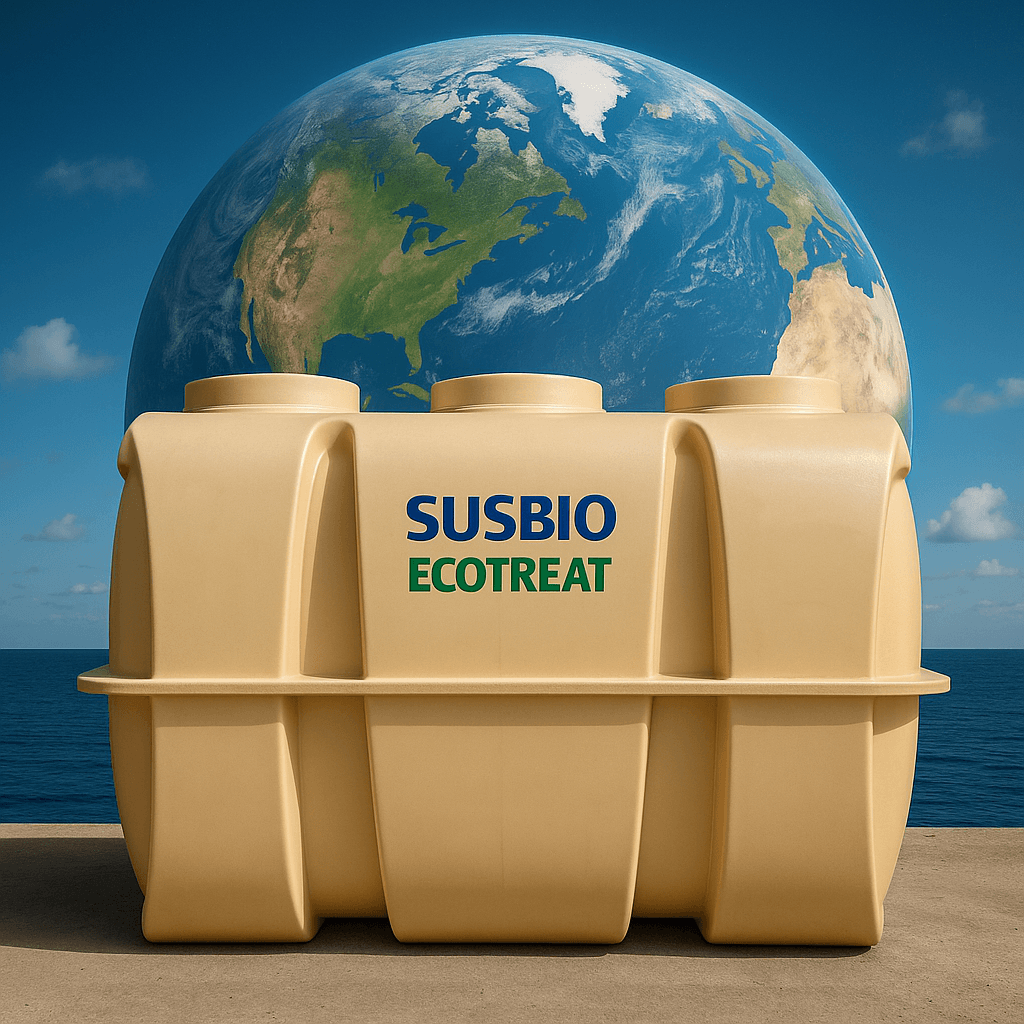UAE has established more than 160 wastewater treatment plants by 2025, with a combined capacity of over 3 million cubic meters daily. The nation’s water management strategy relies heavily on these sewage treatment facilities, as 73% of treated wastewater helps irrigate landscapes nationwide.
Our 24-year manufacturing experience in wastewater treatment systems gives us deep insights into the challenges businesses and municipalities face in Dubai and UAE. We design custom sewage treatment solutions that range from 2 KLD to 1000 KLD capacity systems. Each system meets Dubai Municipality standards and serves the needs of factories, residential complexes, and commercial establishments of all types.
The UAE Water Security Strategy 2036 sets an ambitious target to boost treated water reuse to 95% by 2036. This target shows how significant advanced and efficient STP technologies have become. SUSBIO ECOTREAT stands out as an innovative packaged STP system that delivers future-ready capabilities for growing regional demands. This piece examines the requirements, benefits, and technologies that power custom sewage treatment plants meeting UAE’s strict standards.
Understanding Sewage Treatment Plant Requirements in UAE

UAE sewage treatment plants must follow strict requirements that protect the environment and help reuse water. These rules guide facility operations and technology choices.
Municipal Compliance vs Industrial Needs
The UAE’s wastewater sector presents unique regulatory challenges for municipal and industrial facilities. Large municipal projects often use Special Purpose Vehicles (SPVs) to build treatment facilities. Abu Dhabi proved this works when an SPV built a 300,000 m³/day treatment plant. Industrial facilities need to meet specific pre-treatment standards before they can send wastewater to municipal systems. Breaking these rules comes with heavy penalties. Businesses could pay fines up to AED 100,000 for improper disposal. They might even face license suspension or have to close their facility for up to six months.
Environmental Impact and Water Reuse Goals
The UAE’s water reuse targets are bold, given its limited freshwater resources. Dubai’s water reuse rate stands at an impressive 90%. The city aims to push this to 100% by 2030. This smart approach saves about AED 2 billion each year by reducing dependence on desalinated water. A 2,400-kilometer distribution network carries treated wastewater that waters roughly 10,400 hectares of green spaces. The treated water serves many purposes. It powers central cooling stations, which saved 47% in costs (AED 7.1 million in 2022). It also helps with firefighting and industrial processes.
Dubai STP Regulations and Licensing Process
Dubai Municipality’s Sewerage and Recycled Water Projects Department watches over all treatment facilities. Dubai’s Design Guidelines require plants to plan for at least 15 years of capacity. No changes are allowed unless officially approved. Plants must use tertiary treatment as their minimum standard. Existing dual treatment facilities have five years to upgrade. The rules also say systems must have backup equipment to keep running at full capacity during maintenance.
SUSBIO ECOTREAT offers an advanced packaged STP solution that meets these tough standards. Its compact, adaptable design fits well in UAE’s urban spaces. The system follows Dubai Municipality’s strict water quality rules and supports the nation’s water security goals through effective treatment and reuse.
Comparing Custom and Standard STP Systems
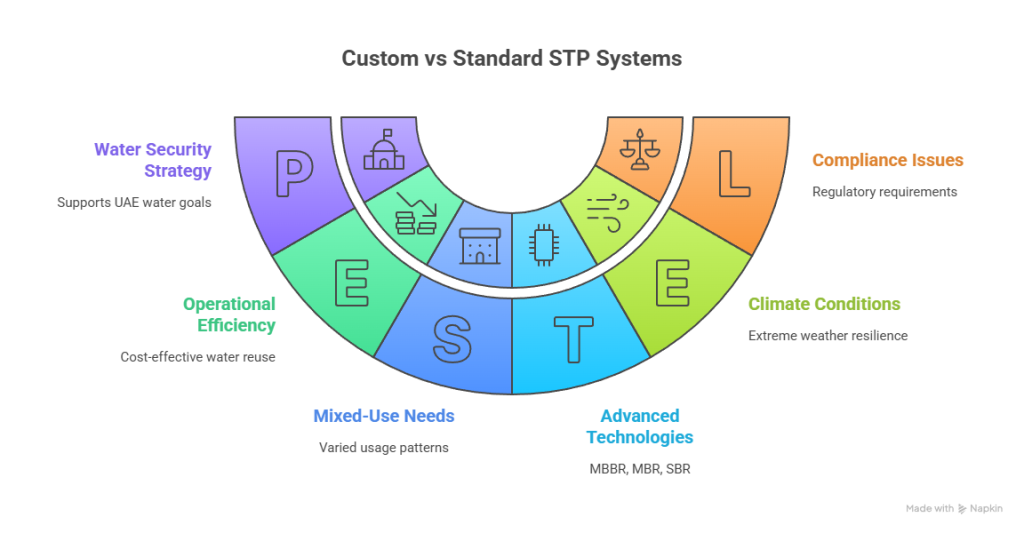
The difference between custom and standard sewage treatment systems is vital to determine operational efficiency. This becomes especially important with UAE’s unique environmental conditions. Custom sewage treatment plant UAE solutions provide tailored approaches that standard systems can’t match.
Benefits of Custom STP for UAE Climate
Custom sewage treatment plants treat domestic wastewater from facilities of all types. Hotels, commercial complexes, residential communities, and hospitals use these systems to convert wastewater into safe, reusable water for industrial purposes. Each system’s design takes into account your facility’s specific sewage volume, space limitations, and budget.
Custom STPs in UAE use advanced technologies like MBBR, MBR, and SBR. These systems deliver better treatment efficiency than standard solutions. They support the UAE Water Security Strategy 2036 by enabling water reuse and reducing the need for freshwater resources.
Limitations of Off-the-Shelf STP Units
Standard off-the-shelf STP units don’t deal very well with UAE’s extreme climate conditions. This leads to operational inefficiencies and compliance issues. Pre-fabricated systems lack the flexibility needed for UAE’s varied wastewater composition and regulatory requirements.
Custom solutions like containerized sewage treatment plants are a great way to get different configurations. These help address various scales of wastewater treatment needs. The options range from single-container systems for smaller applications to modular plants with multiple containers for larger projects.
Case Example: Custom STP for Mixed-Use Development
Mixed-use developments create complex challenges for wastewater management because of their varied usage patterns. The Hamarain mixed-use development in Ras Al Khaimah shows this perfectly. This project includes offices, residences, a hotel, and a shopping mall. It needed high-performing systems and careful planning to manage water within its complex architecture.
The project showed how custom solutions meet the unique needs of mixed-use developments. Specialized systems like SUSBIO ECOTREAT represent the most advanced packaged STP solutions available. These systems offer future-ready capabilities with compact, expandable designs that fit UAE’s urban environments perfectly. The project achieved optimal water management despite architectural complexities through customization. This highlights why local expertise matters when implementing sewage treatment systems in UAE.
Future-Ready STP Technologies in UAE
UAE’s sewage treatment sector now uses innovative technologies to tackle water shortage through improved efficiency and sustainability. These forward-looking solutions transform wastewater processing in emirates.
SUSBIO ECOTREAT: Compact and Flexible STP
SUSBIO ECOTREAT leads as the most advanced packaged sewage treatment plant suited for UAE conditions. This fiber-reinforced plastic (FRP) system uses a dual-treatment process that combines anaerobic and aerobic methods to purify wastewater better. The modular design comes in two distinct models:
- Cylinder Type for medium to large applications (20-500 KLD capacity)
- Capsule Type for smaller installations (1-20 KLD capacity)
The system’s plug-and-play setup lets you install it within weeks instead of months needed for regular STPs. The prefabricated design also cuts down labor costs and setup time.
Smart Sensors and IoT in STP Monitoring
UAE’s modern sewage treatment facilities now use Internet of Things (IoT) technology to monitor systems better. These smart systems provide:
Live water quality tracking spots problems right away, so you can step in quickly. The system also studies equipment performance data to predict failures before they happen—which keeps downtime low and makes equipment last longer.
SUSBIO ECOTREAT’s newest models come with IoT-based controls that give you live data, remote management, and predictive analytics. This ensures peak performance with minimal supervision.
Energy-Efficient Aeration and Sludge Reduction
Dubai’s STP manufacturers focus mainly on energy efficiency. SUSBIO ECOTREAT uses 90% less electricity than standard sewage treatment plants. A typical 50 KLD installation uses only 720 kWh monthly compared to 7,200 kWh in traditional systems.
Many UAE sewage treatment plants now use solar power with optimized aeration processes to cut their energy use drastically. High-efficiency motors along with Rotary Screw and Centrifugal technologies help achieve the lowest ownership costs through energy and maintenance savings.
Top UAE STP Companies and Their Offerings
Major companies control the sewage treatment plant UAE market. Each company brings its own strengths to tackle the country’s wastewater challenges.
Best STP Company UAE: Evaluation Criteria
Facility managers need to assess these key factors before choosing an STP company:
- Industry experience and expertise (minimum 20+ years preferred)
- R&D investment and technological breakthroughs
- The ability to customize solutions for specific projects
- Maintenance services and after-sales support
- Meeting Dubai Municipality standards
STP Manufacturer Dubai vs Other Emirates
GTS Enviro leads the market with 24+ years of experience. The company builds systems ranging from 2 KLD to 2000 KLD. AL Kafaah has created many groundbreaking plants during its 37-year history. BESIX Group, known as Six Construct in the Middle East, excels in MBBR and MBR technologies. Pure Water, based in Abu Dhabi, delivers high-quality water as a premier EPC contractor.
Sewage Treatment Company Dubai: Local Expertise Matters
Understanding Dubai’s complex regulations is a great way to get the right solutions. Ravi Enviro Industries has 53+ years of experience and provides complete turnkey solutions throughout UAE. Metito has delivered sustainability services for more than 60 years. SUSBIO ECOTREAT stands out as the most advanced packaged STP solution. The company will give a 100% compliance with Dubai Municipality regulations.
Conclusion
Custom sewage treatment plants are crucial to UAE’s ambitious water management strategy. In this piece, we explored how these specialized systems meet Dubai Municipality standards and tackle the region’s unique climate challenges. The difference between custom and standard STP solutions becomes clear when we look at their long-term operational efficiency and compliance capabilities.
SUSBIO ECOTREAT emerges as the most advanced packaged STP solution for UAE conditions today. The system delivers exceptional results through its compact, flexible design and dual-treatment process that combines both anaerobic and aerobic methods. On top of that, it uses up to 90% less electricity than conventional systems, which aligns with UAE’s sustainability goals.
Smart sensors and IoT technology integration substantially improves modern STP systems. These technologies enable up-to-the-minute data analysis and predictive maintenance that reduces downtime. This helps facilities perform optimally while meeting Dubai Municipality’s strict requirements.
UAE’s wastewater management future looks bright as the country moves toward its Water Security Strategy 2036 goals. Custom STP solutions will without doubt keep evolving and incorporate newer technologies while following local standards. Our decades of industry experience tell us that you should work with reputable companies that understand local regulations and can deliver tailored solutions for your specific wastewater management needs.
Key Takeaways
Understanding the critical requirements and advanced solutions for sewage treatment in UAE helps businesses and municipalities make informed decisions for sustainable water management.
- Custom sewage treatment plants in UAE must comply with Dubai Municipality standards, requiring tertiary treatment and 15-year capacity projections with no deviations permitted.
- SUSBIO ECOTREAT offers the most advanced packaged STP solution, consuming 90% less electricity than conventional systems while providing compact, scalable design.
- UAE aims for 95% treated water reuse by 2036, with Dubai already achieving 90% reuse rate, saving AED 2 billion annually through reduced desalination dependency.
- Custom STP systems outperform standard units in UAE’s extreme climate, offering tailored solutions for specific wastewater volumes, space constraints, and regulatory requirements.
- Smart IoT integration enables real-time monitoring and predictive maintenance, ensuring optimal performance with minimal human oversight while preventing costly downtime.
The success of UAE’s water security strategy depends on implementing future-ready STP technologies that combine regulatory compliance with operational efficiency and environmental sustainability.
Frequently Asked Questions
Q1. What are the key requirements for sewage treatment plants in Dubai?
Sewage treatment plants in Dubai must meet stringent standards set by the municipality. These include tertiary treatment as the minimum standard, a 15-year capacity projection, and sufficient redundancy to maintain full operational capacity during maintenance. Compliance with these regulations is essential for all STP facilities in the emirate.
Q2. How does SUSBIO ECOTREAT compare to conventional sewage treatment systems?
SUSBIO ECOTREAT is an advanced packaged STP solution that offers significant advantages over conventional systems. It consumes up to 90% less electricity, features a compact and scalable design, and utilizes a dual-treatment process combining anaerobic and aerobic methods. This makes it highly efficient and well-suited for UAE’s urban environments and sustainability goals.
Q3. What are the benefits of custom STPs for UAE’s climate conditions?
Custom sewage treatment plants are specifically engineered to handle UAE’s extreme climate conditions. They offer tailored solutions for specific sewage volumes, space limitations, and regulatory requirements. These systems employ advanced technologies like MBBR, MBR, and SBR, delivering superior treatment efficiency compared to standard off-the-shelf units.
Q4. How is smart technology being integrated into modern STPs in UAE?
Modern sewage treatment plants in UAE are incorporating Internet of Things (IoT) technology for enhanced monitoring and management. This includes real-time water quality tracking, predictive maintenance, and remote management capabilities. These smart systems allow for immediate detection of deviations and timely interventions, minimizing downtime and optimizing performance.
Q5. What progress has UAE made in water reuse through its sewage treatment initiatives?
UAE has made significant strides in water reuse through its sewage treatment initiatives. Dubai currently achieves a 90% water reuse rate, with plans to reach 100% by 2030. This has resulted in substantial economic benefits, saving approximately AED 2 billion annually through reduced reliance on desalinated water. The country aims to increase the reuse of treated water to 95% by 2036 as part of its Water Security Strategy.


